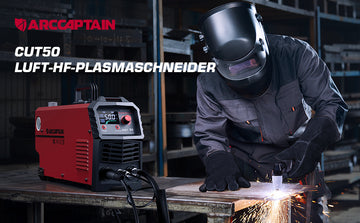When it comes to welding, understanding the appropriate parameters for different metal thicknesses is crucial for achieving high-quality results.
At ARCCAPTAIN, we have compiled a suggested guide to help you determine the ideal Amperage and PSI settings for various metal thicknesses. Take a look at the following image:


As a beginner welder, it's important to understand the suggested amperage and air settings for a plasma cutter. Let's delve into each parameter in detail:
-
Suggested Amperage: The suggested amperage refers to the optimal electrical current required for operating the plasma cutter effectively. It is typically determined based on the thickness and type of metal you are cutting. Higher amperage settings are suitable for thicker metals, while lower amperage settings work better for thinner materials. The manufacturer usually provides a recommended amperage range for different thicknesses of metal. It's crucial to adhere to these guidelines to achieve clean and accurate cuts.
-
Air Setting: The air setting pertains to the flow rate of compressed air used in conjunction with the plasma cutter. Compressed air blows through the nozzle to create a focused, high-velocity stream that cuts through the metal. The air setting depends on factors such as the material thickness, desired cut quality, and the specific plasma cutter model. Insufficient air pressure can result in incomplete cuts, while excessive air pressure can cause unnecessary dross formation and reduced cutting speed. The plasma cutter manufacturer typically provides a recommended air pressure range for different cutting applications.
To determine the optimal amperage and air setting for your plasma cutter, consider the following steps:
-
Refer to the plasma cutter's user manual: The user manual should contain a chart or table specifying the suggested amperage and air settings for various metal thicknesses.
-
Conduct test cuts: Before starting a project, it's advisable to conduct test cuts on scrap material. Begin with the manufacturer's recommended settings and adjust gradually if necessary. Evaluate the cut quality, including the smoothness, dross formation, and overa ll accuracy, to determine if any adjustments are needed.
-
Seek expert advice: If you encounter difficulties or have specific cutting requirements, consider consulting with experienced welders or contacting the plasma cutter manufacturer's customer support. They can provide valuable insights and guidance tailored to your specific needs.
Remember, precise amperage and air settings play a vital role in achieving optimal cutting results with a plasma cutter. Always prioritize safety by wearing appropriate protective gear and following proper operating procedures outlined in the user manual.
ArcCaptain offers more than just plasma cutters; they also provide a diverse range of small welding machines, TIG welder parts, small TIG welder, top-rated welding helmets, and a variety of tungsten colors.
Cut50 Plasma Cutter Suggested Amperage & Air Setting Cutter Chart
Here is a summary of the recommended parameters for different thicknesses of materials and the corresponding amperage and air pressure settings:
| Voltage | Thickness (mm/inch) | Amperage | Air Pressure (psi) |
| 220V | 5mm (3/16 inch) | 20A | 40-50 |
| 220V | 8mm (5/16 inch) | 35A | 50-60 |
| 220V | 10mm (3/8 inch) | 40A | 60-70 |
| 220V | 12mm (1/2 inch) | 45A | 60-70 |
| 220V | 15mm (5/8 inch) | 50A | 110V |
| 110V | 5mm (3/16 inch) | 20A | 40-50 |
| 110V | 6mm (1/4 inch) | 30A | 40-50 |
| 110V | 8mm (5/16 inch) | 35A | 50-60 |
These settings provide a guideline for achieving optimal welding results based on the thickness of the materials you are working with. However, please note that these are general recommendations and specific welding equipment and materials may require adjustments. It is always important to refer to the user manual of your specific welding machine for accurate and detailed parameter settings. Conducting test welds and making adjustments based on your specific application is also recommended to achieve the desired welding quality.

